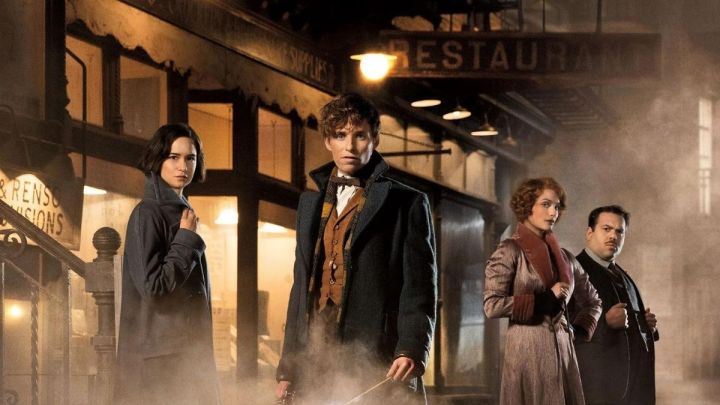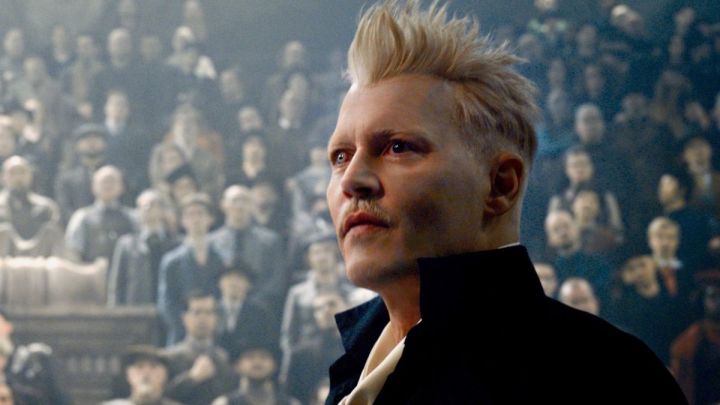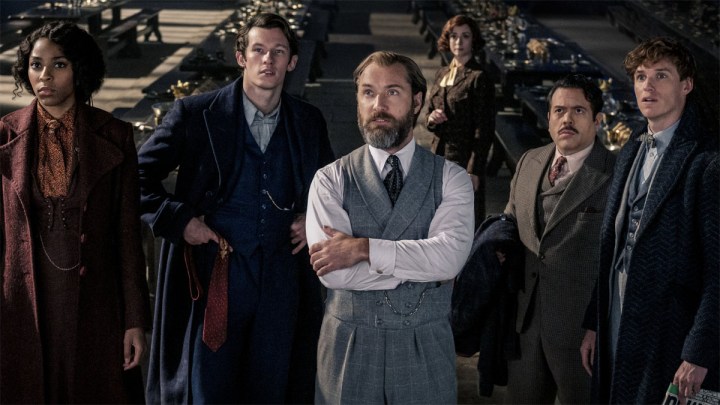The Fantastic Beasts franchise’s attempt to roar back into life was quasi-successful. The Crimes of Dumbledore received mixed reviews from critics, who called it an improvement over its predecessor while still questioning its existence and purpose. Three movies in, this attempt at expanding the Wizarding World is uneven, to say the least. It doesn’t help that the franchise remains unfocused, clumsily trying to replicate the formula that made the Potter films so successful while lacking any of their gravitas and emotional resonance. Audiences don’t care about awkward outsider Newt Scamander and his merry band of misfits, nor are they invested in the doomed romance between Dumbledore and Grindelwald.
Fantastic Beasts is a case study of how not to expand a franchise. From the start, the series seemed like a shameless cash-grab, a thinly-veiled attempt at milking the revolutionary cow that is the Wizarding World. Yet, despite a committed ensemble of capable actors and impressive VFX, this new story’s freshness or originality gets lost in a sea of questionable casting and narrative choices, confusing storytelling, and a slew of behind-the-scenes scandals that have become more interesting than the movies themselves.
Doomed from the start

The choice to base this so-called new chapter in the Wizarding World on the spin-off book Fantastic Beasts and Where to Find Them raised eyebrows from the start. Would this be a documentary-style adventure for the world of Harry Potter? Or would it be an old-fashioned action-adventure escapade, an Indiana Jones yarn with wands and robes? The answer was more complicated but somehow unbearably boring.
The first Fantastic Beasts followed a charming yet utterly forgettable Eddie Redmayne as the equally charming yet unimpressive Newt Scamander, a magizoologist who sets several magical creatures loose in 1920s New York. The setup was promising enough, and the casting of actors like Dan Fogler and Katherine Waterston promised a new side to the overly English world of Potter and his friends. Most of the film focused on the titular creatures, with a few slight detours into two love stories. However, any goodwill it achieved came crashing down with a third-act plot twist that seemed more like a cop-out.
And therein lies the first major mistake of the saga. By retreating into familiar territory and actively rejecting any real innovation, it reveals itself as a one-trick pony. Rowling and company seem too scared of exploring the sprawling world she created, instead favoring the same beats that were already tired by the eighth Potter film. Considering there’s such a vast playground and many toys to play with, why are they so fixated on focusing on the same ones? Is Rowling so distrustful of her creation that she believes it won’t succeed without the usual suspects?
The Wizarding World is full of unexplored possibilities away from the concept of a wizarding war. Fantastic Beasts could’ve been successful as a stand-alone adventure, opening the door for other similar episodes of global wizarding history, perhaps a quidditch-centric action film drawing inspiration from Quidditch Through Time? The Wizarding World could’ve been the first cinematic anthology series, delivering new adventures taking place in the same universe but following new characters and perspectives. If Rowling is truly committed to diversity, why not give audiences a story set in Africa, perhaps exploring the relationship between magic and voodoo? Why not a story set in South America, exploring the magical consequences of Britain’s colonization? The Potter books have a huge international fanbase, and those fans would certainly pay to see themselves represented on screen.
Haven’t we seen this villain before?

Villains have never been Rowling’s strong suit, but Colin Farrell’s Percival Graves was a welcome presence in the Wizarding World. He was menacing yet restrained, a pleasant change from the flamboyant villains that plagued the Potter franchise. From the all-pink Dolores Umbridge to the scenery-chewing duo of Voldemort and Bellatrix, subtlety wasn’t a thing for the Potter bad guys. Thus, Farrell seemed like a breath of fresh air, or at least he was before turning into a white-faced, blonde-haired, ghoul-like man played by Johnny Depp, master of the extreme.
Depp is a very controversial figure who suffered one of the most spectacular falls from grace Hollywood has ever seen. However, private life aside, Depp is also a divisive actor whose penchant for over-the-top performances has earned him somewhat of an unfavorable reputation. Once the undisputed Hollywood rebel and king of the eccentrics, Depp’s roles during the 2010s — the Mad Hatter, Mortdecai, Tonto, and even Jack Sparrow — turned him into the court jester, an actor who delivered weird for the sake of it.
To his credit, Depp considerably toned his shtick down for Grindelwald and tried to provide some layers to the character to distance him from Fiennes’ balls-to-the-wall Voldemort. However, there was simply not enough story to differentiate both characters. Grindelwald and Voldemort have the same goals, with the Potter films outright declaring that Voldemort was essentially a more dangerous version of Grindelwald. Furthermore, fans knew that Grindelwald wouldn’t prevail because of the seven books and eight movies taking place after his reign of terror. By using a villain that felt like a step-down compared to their previous dark wizard, Rowling and Warner Bros. shot themselves in the foot.
Following Depp’s controversies, Warner Bros. recast the role with Mads Mikkelsen. The Danish actor brings new energy to the role, abandoning any sense of eccentricity in favor of a straightforward approach to villainy. There’s no platinum blonde wig or greyish eyes; instead, Mikkelsen relies on the charisma that Grindelwald supposedly always had, enticing his followers with a mix of clever words and good, old-fashioned charm.
Comparisons between the two actors further cloud any sense of individuality Grindelwald has, again reducing him to an afterthought. So why did Rowling and Warner though it a good idea to have him as the central villain in a five-film series? True, they couldn’t have possibly anticipated Depp’s troubles, but his casting was problematic from the start. Depp is an actor who always does the most; considering Fiennes already did a lot with Voldemort, shouldn’t a distinctively different approach like Mikkelsen’s make more sense as a follow-up? In casting Depp, the powers-that-be again proved their penchant for repeating themselves, not only by using a dark wizard as the antagonist but by selecting an actor that would choose excess over nuance. Surely countless non-dark-wizard figures in the Wizarding World would make compelling villains; it’d be nice to meet them in one of these movies.
Characters up the wazoos

The first Fantastic Beasts had a clear-enough plot, but its ending set up the future conflict between Grindelwald and Dumbledore. And yet, the sequel did a poor job at exploring this conflict, keeping both characters separate via a cheap magical excuse. Furthermore, it diluted its story by insisting on keeping Credence Barebone around, providing him with a needlessly complicated storyline that involved a traveling circus, the Lestrange family, and Nagini the snake, for some reason.
Furthermore, the franchise keeps adding new characters and hardly giving them anything to do. The Crimes of Grindelwald already had multiple additions that barely factored in the storyline, including Yusuf Kama and the aforementioned Nagini; it’s glaring that all these figures are played by POC actors, making Rowling’s clumsy attempts at diversity seem disingenuous. The Secrets of Dumbledore repeats this mistake by introducing yet another slew of players, and while this new batch seems to play a more active role in the story, their importance comes at the expense of previous characters.
There’s a reason why Game of Thrones works better as a multi-episode television series; its gargantuan cast demands extended attention, as does the intricacies of Westerosi political and social life. But there’s only so much a two-hour movie can do with an ever-growing cast of characters, each with individual storylines, purposes, and desires. So why not take a note from the Thrones guide and continue the Grindelwald saga as a small screen series?
We live in the golden age of streaming, and television is no longer where A-listers go to slum it. The franchise’s two major stars, Law and Mikkelsen, already have experience with television shows, so it wouldn’t be a major downgrade for them. Television would also provide the perfect opportunity for the saga to carry on and tell its story as it pleases. One 10-episode season would be enough to make up for the two films that are supposedly still to come, providing even more time to further develop the storyline.
Gay-baiting at its worst

When J.K. Rowling revealed that Dumbledore was gay, fans worldwide showed skepticism. There had been no sign in the seven Potter books or the eight big-screen adaptations to show Dumbledore’s homosexuality, yet the story’s author assured fans he had lived a passionate romance with Grindewald. So when the two were announced as characters in The Crimes of Grindelwald, fans were hopeful that some much-needed representation would finally come to the franchise. However, the movie made only vague suggestions about their “special bond.” Rowling insisted the two characters had, in fact, been lovers, but she never bothered exploring their relationship, a bizarre approach for an author who should know that showing is always better than telling.
The Secrets of Dumbledore attempts to remedy this but again falls short by treating the central relationship as taboo. It might make sense for the story — Grindelwald is evil, after all — but this censorship can’t help but translate to the LGBTQ+ aspect of the romance, especially when gay relationships still get frowned upon by certain conservative groups in real life. Furthermore, for all their talk of love, there’s no evident physical demonstration, despite Law and Mikkelsen’s honest efforts to sell the star-crossed lovers’ angle through suggestion and sheer force of will.
If Rowling and company truly want to be champions for representation, they need to go all-in on the premise; it’s not enough to say the characters were lovers. People keep acting as if showing a gay kiss on a so-called “all-ages family adventure” would be too risqué, but this thought is regressive and dangerously conservative because it implies there’s something wrong with two men expressing physical love for each other. There shouldn’t be an issue with showing a gay kiss in 2022, and the more franchises and studios postpone it, the further we are from destigmatizing LGBTQ+ relationships.
A journey without a clear destination

Perhaps Fantastic Beasts‘ most egregious mistake is wasting its audience’s time telling a story without a clear purpose. Whereas the Harry Potter saga largely succeeded by framing the story as a Harry versus Voldemort confrontation from the start, FB keeps taking unnecessary detours into stories that seem like dead ends. Is this a classic hero’s journey for Newt Scamander or the tale of two lovers separated by their diverging ideologies? Is this a story about a band of misfits finding common ground through a shared enemy or the tale of how a reluctant wizard discovered the heroism inside?
Fantastic Beasts is trying to be too many things at once and failing spectacularly. The plot is convoluted, the characters purposeless, and the endgame unclear. Fans won’t become invested in a franchise that can’t seem to pull itself together, and after three films, no less. This struggling series needs a firm captain that steers the wheel in the right direction, one that might not necessarily be J.K. Rowling. She proved herself a gifted novelist, but screenwriting and franchise-planning are not her strong suit.
Furthermore, the saga needs to narrow its ambitions and expectations. Some of its stories are on life support already — mainly Credence and the Newt/Tina romance — so it should wrap them up as soon as possible. A more focused fourth film, one with a clear lead and purpose, would go a long way in salvaging the franchise. Sure, this approach might go against the series’ overly-ambitious attempts so far, but it might also be its saving grace.
The Wizarding World isn’t dead by any means, despite the underwhelming opening and disastrous second weekend of The Secrets of Dumbledore, but the Fantastic Beasts series might be, and there’s nothing wrong with that. Not every Bond film has been a winner, and the Lord of the Rings franchise also had its disappointing trilogy with The Hobbit. Moreover, J.K. Rowling’s direct involvement in Fantastic Beasts is also proving to be a setback, so Warner might want to wrap this chapter up already and move on to other corners of the vast Wizarding World. Honestly, no one would blame them for it.
Editors' Recommendations
- Where to watch all the Harry Potter movies
- It’s time to explore other corners of the Wizarding World
- Fantastic Beasts 3 trailer pits Dumbledore vs. Grindelwald
- Fantastic Beasts: The Secrets of Dumbledore trailer sends the wizards to war
- Fantastic Beasts 3 now has an official title and 2022 release date




